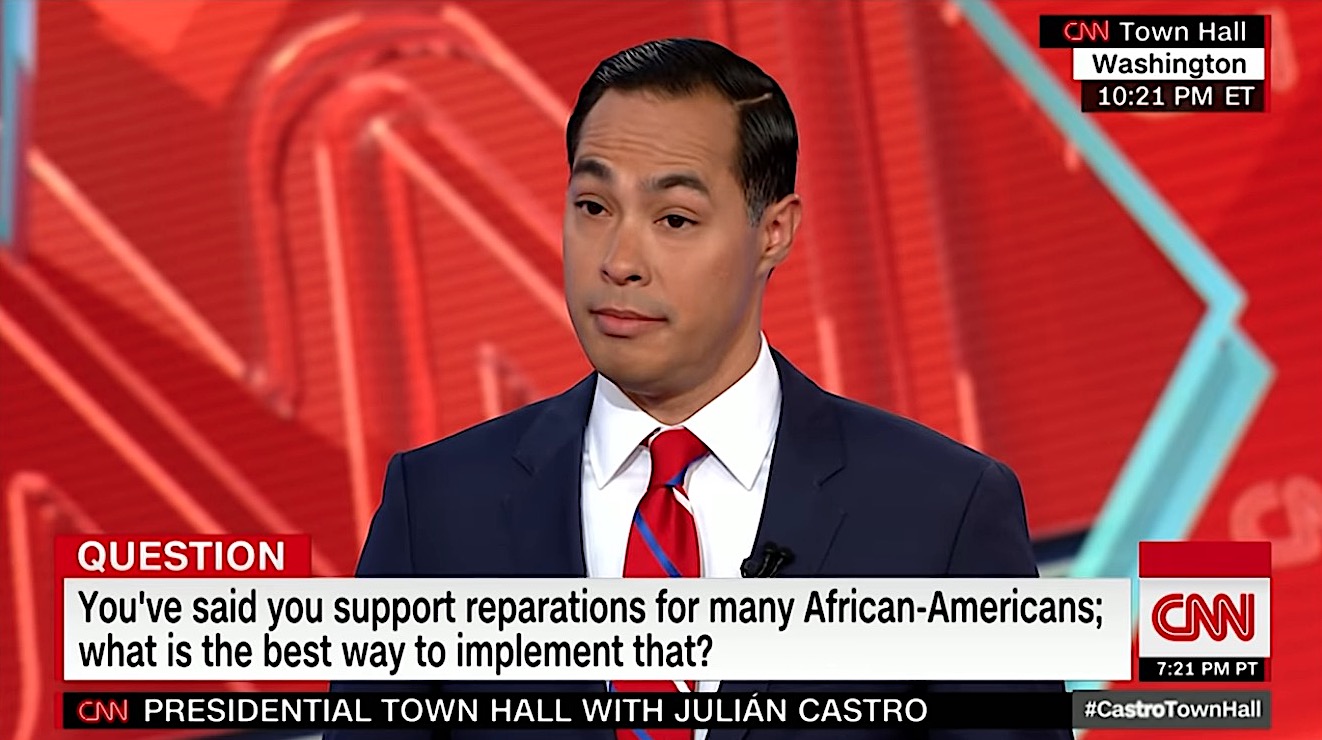2020 presidential hopeful Julian Castro makes a clear moral case for slavery reparations


A free daily email with the biggest news stories of the day – and the best features from TheWeek.com
You are now subscribed
Your newsletter sign-up was successful
At a CNN town hall in Washington, D.C., on Thursday night, Democratic 2020 presidential hopeful Julian Castro was asked the best way to implement reparations for slavery, an idea he supports. He started by saying "we have never fully addressed in this country the original sin of slavery," and "because of that, we have never truly healed as a country." Castro continued:
Sometimes people say, you know, they'll ask me: 'Well, nobody today was a slave owner, and nobody today that's living was a slave.' And I say, you know, if somebody is out there that's 25 years old and they say: 'Why are you talking to me? I never owned slaves.' I'd say that, you know, that 25-year-old person never fought in the Pacific, that 25-year-old person never had a hand in writing the Constitution of our great country, that 25-year-old person never marched with the women who were marching for the power to vote, they didn't march at the Edmund Pettus Bridge. ... In other words, even though we weren't there in past generations, we've inherited a lot of moral assets, but you know what? We've also inherited some moral debts, and one of those debts we've never paid is the debt for that original sin of slavery. [Julian Castro]
Castro, a recent Housing and Urban Development secretary and former mayor of San Antonio, didn't endorse any reparations mechanism, saying he supports legislation by fellow Texas Democrat Rep. Shelia Lee Jackson to have a commission craft a reparations plan.

Castro also said the "one idea or piece of advice" we would give President Trump is to "follow the law," reiterated his support for legalizing marijuana, said that as president he would work to expunge all criminal records for marijuana use, and joked to the person who asked about marijuana: "Look, your last name is Stone; I won't assume you're a stoner. My last name is Castro; don't assume I'm a dictator."
The Week
Escape your echo chamber. Get the facts behind the news, plus analysis from multiple perspectives.

Sign up for The Week's Free Newsletters
From our morning news briefing to a weekly Good News Newsletter, get the best of The Week delivered directly to your inbox.
From our morning news briefing to a weekly Good News Newsletter, get the best of The Week delivered directly to your inbox.
A free daily email with the biggest news stories of the day – and the best features from TheWeek.com
Peter has worked as a news and culture writer and editor at The Week since the site's launch in 2008. He covers politics, world affairs, religion and cultural currents. His journalism career began as a copy editor at a financial newswire and has included editorial positions at The New York Times Magazine, Facts on File, and Oregon State University.
-
 How the FCC’s ‘equal time’ rule works
How the FCC’s ‘equal time’ rule worksIn the Spotlight The law is at the heart of the Colbert-CBS conflict
-
 What is the endgame in the DHS shutdown?
What is the endgame in the DHS shutdown?Today’s Big Question Democrats want to rein in ICE’s immigration crackdown
-
 ‘Poor time management isn’t just an inconvenience’
‘Poor time management isn’t just an inconvenience’Instant Opinion Opinion, comment and editorials of the day
-
 ‘One Battle After Another’ wins Critics Choice honors
‘One Battle After Another’ wins Critics Choice honorsSpeed Read Paul Thomas Anderson’s latest film, which stars Leonardo DiCaprio, won best picture at the 31st Critics Choice Awards
-
 A peek inside Europe’s luxury new sleeper bus
A peek inside Europe’s luxury new sleeper busThe Week Recommends Overnight service with stops across Switzerland and the Netherlands promises a comfortable no-fly adventure
-
 Son arrested over killing of Rob and Michele Reiner
Son arrested over killing of Rob and Michele ReinerSpeed Read Nick, the 32-year-old son of Hollywood director Rob Reiner, has been booked for the murder of his parents
-
 Rob Reiner, wife dead in ‘apparent homicide’
Rob Reiner, wife dead in ‘apparent homicide’speed read The Reiners, found in their Los Angeles home, ‘had injuries consistent with being stabbed’
-
 Hungary’s Krasznahorkai wins Nobel for literature
Hungary’s Krasznahorkai wins Nobel for literatureSpeed Read László Krasznahorkai is the author of acclaimed novels like ‘The Melancholy of Resistance’ and ‘Satantango’
-
 Primatologist Jane Goodall dies at 91
Primatologist Jane Goodall dies at 91Speed Read She rose to fame following her groundbreaking field research with chimpanzees
-
 Florida erases rainbow crosswalk at Pulse nightclub
Florida erases rainbow crosswalk at Pulse nightclubSpeed Read The colorful crosswalk was outside the former LGBTQ nightclub where 49 people were killed in a 2016 shooting
-
 Trump says Smithsonian too focused on slavery's ills
Trump says Smithsonian too focused on slavery's illsSpeed Read The president would prefer the museum to highlight 'success,' 'brightness' and 'the future'
